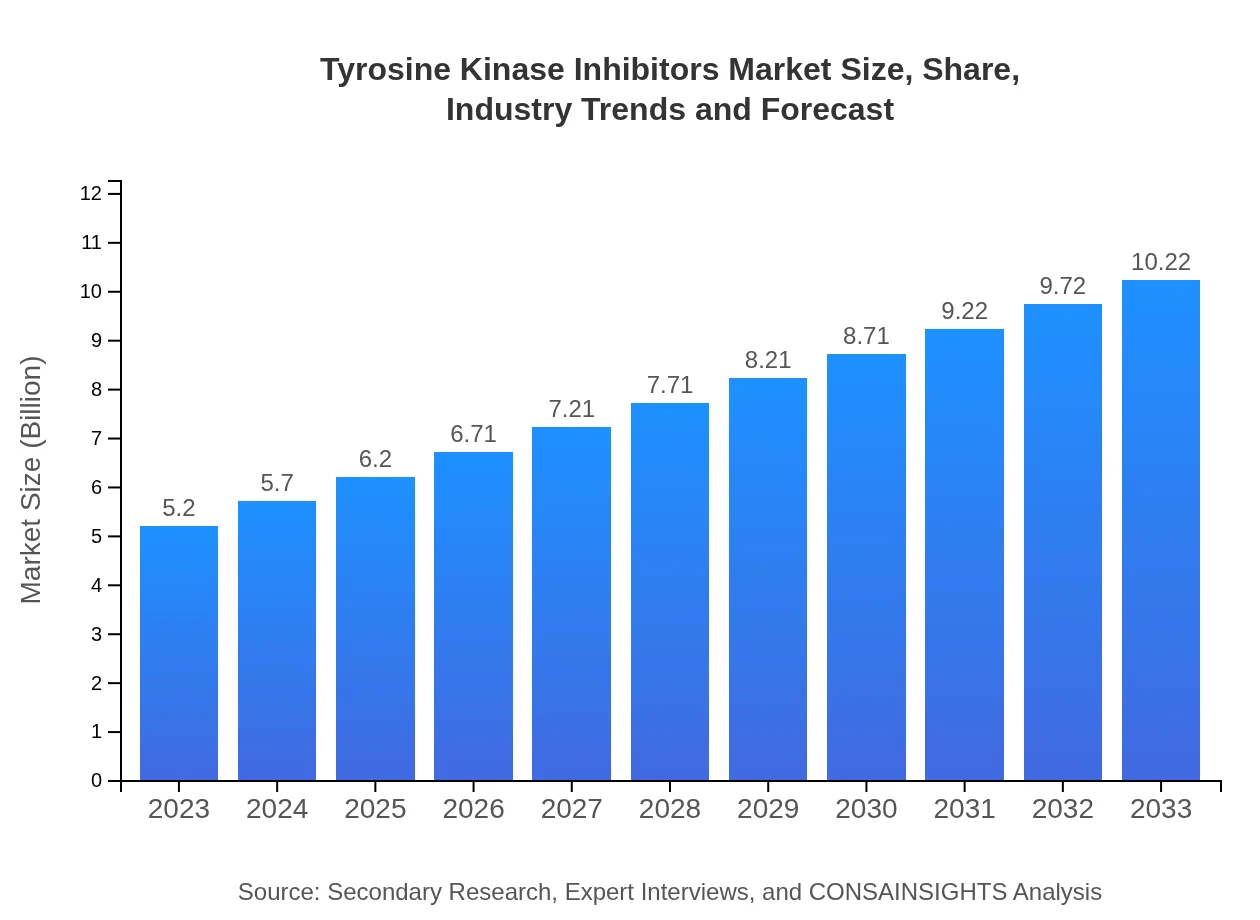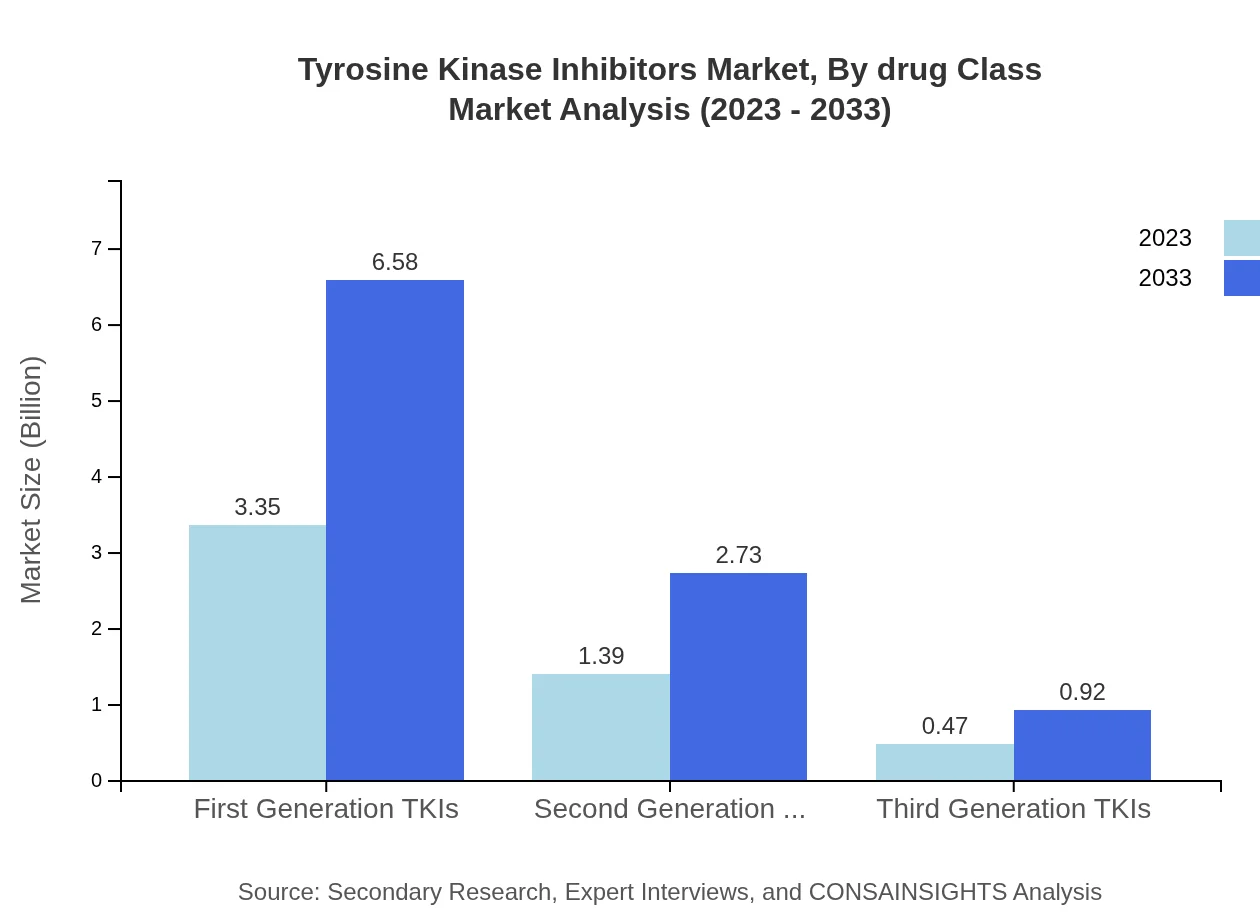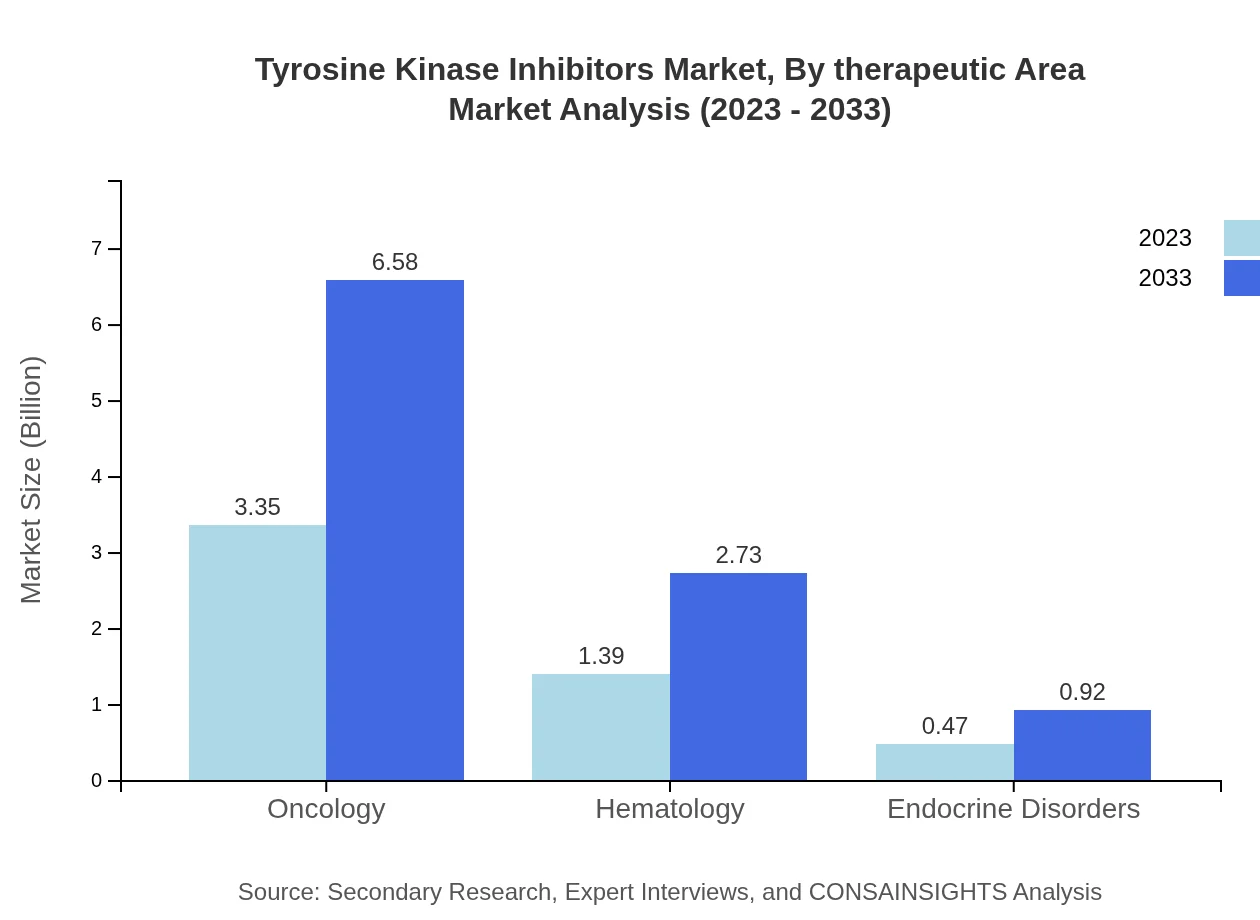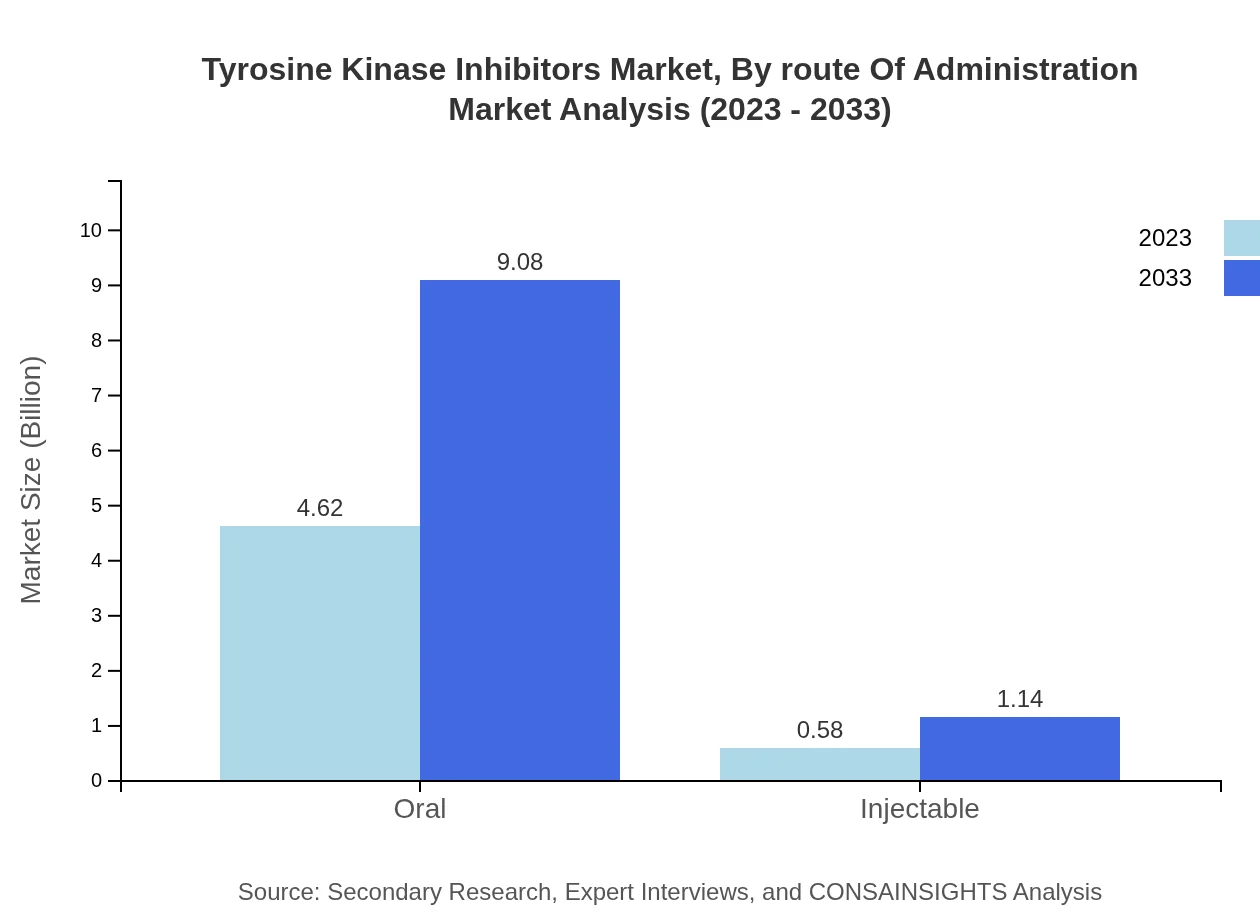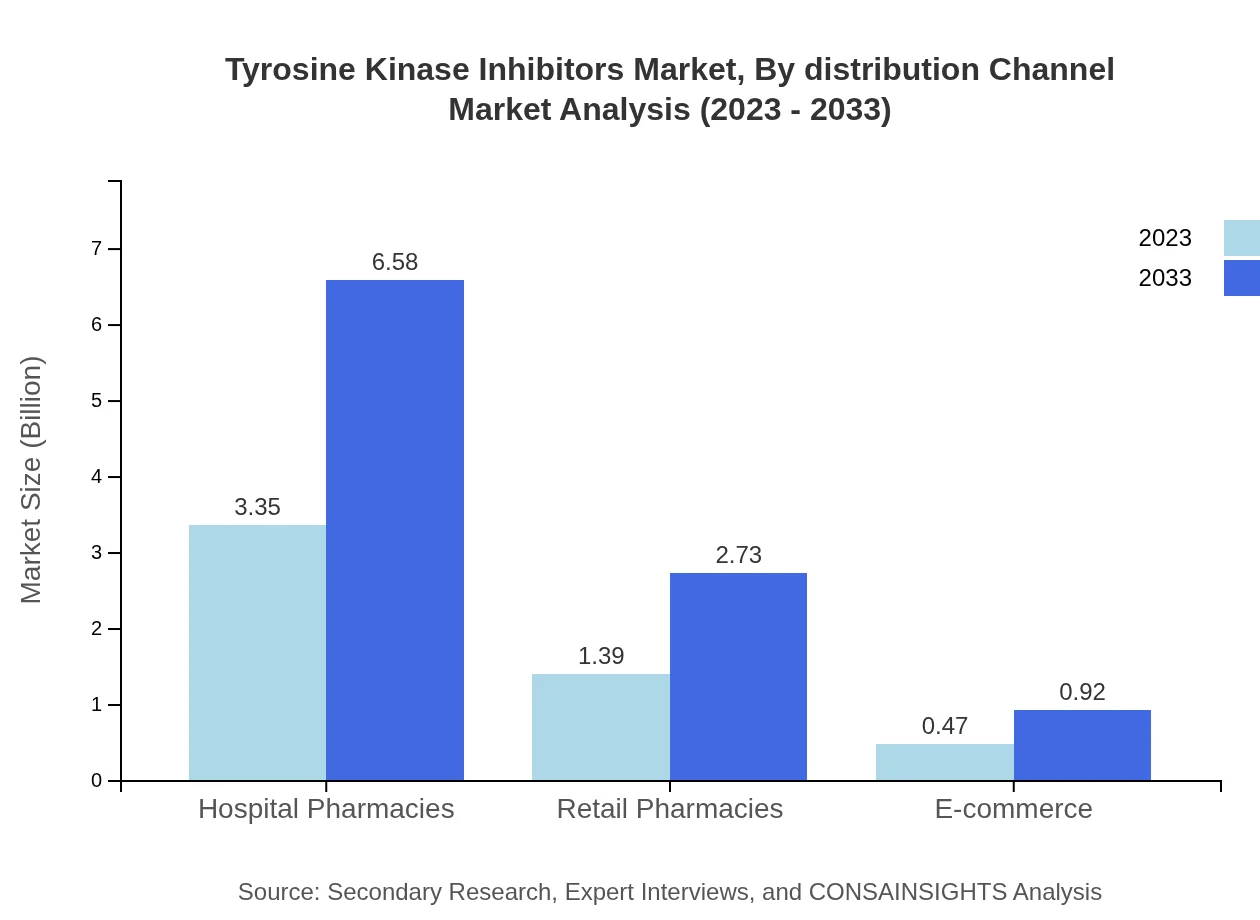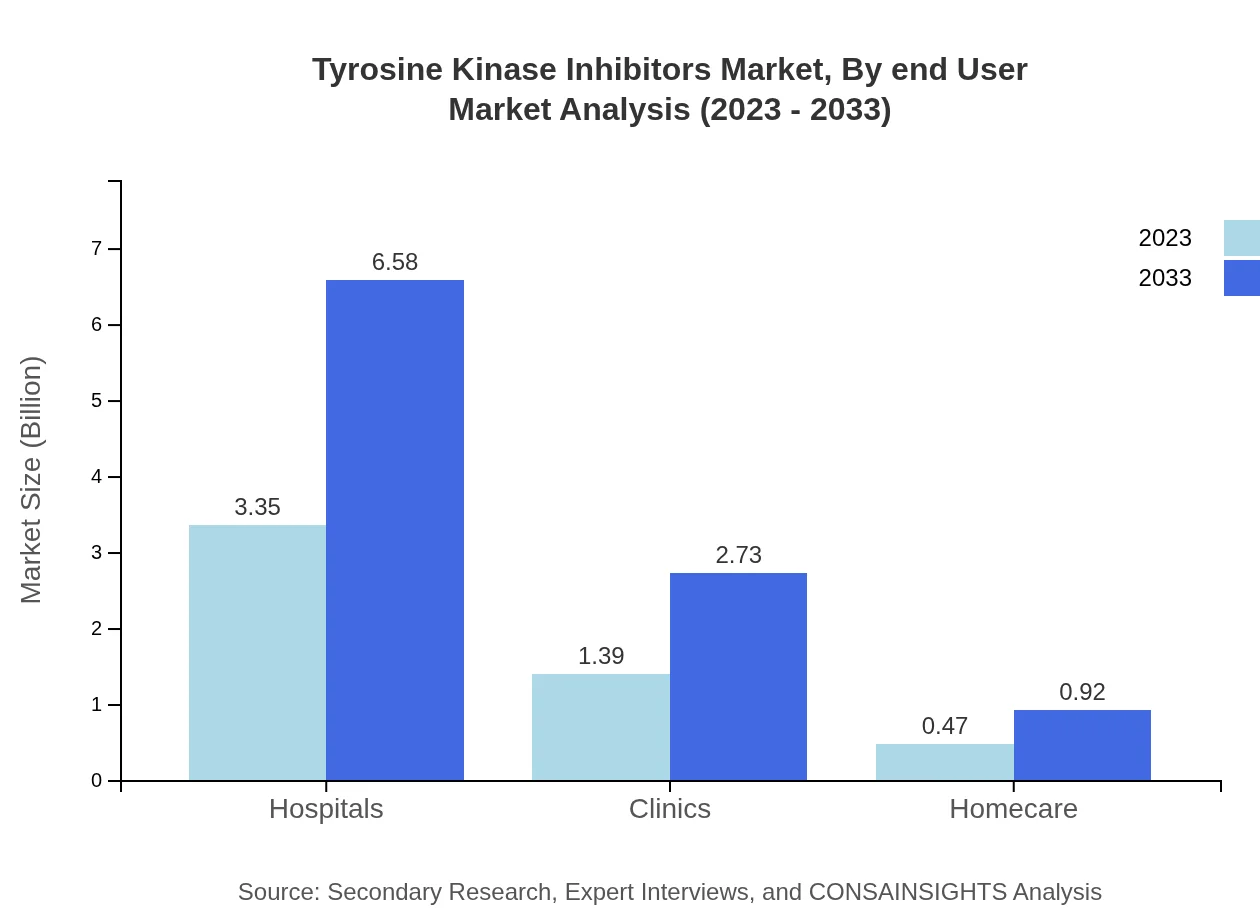Tyrosine Kinase Inhibitors Market Report
Published Date: 31 January 2026 | Report Code: tyrosine-kinase-inhibitors
Tyrosine Kinase Inhibitors Market Size, Share, Industry Trends and Forecast to 2033
This report provides an in-depth analysis of the Tyrosine Kinase Inhibitors market, covering key insights, market size predictions, trends, and competitive landscape from 2023 to 2033.
| Metric | Value |
|---|---|
| Study Period | 2023 - 2033 |
| 2023 Market Size | $5.20 Billion |
| CAGR (2023-2033) | 6.8% |
| 2033 Market Size | $10.22 Billion |
| Top Companies | Novartis, Bristol-Myers Squibb, Pfizer , AstraZeneca, Roche |
| Last Modified Date | 31 January 2026 |
Tyrosine Kinase Inhibitors Market Overview
Customize Tyrosine Kinase Inhibitors Market Report market research report
- ✔ Get in-depth analysis of Tyrosine Kinase Inhibitors market size, growth, and forecasts.
- ✔ Understand Tyrosine Kinase Inhibitors's regional dynamics and industry-specific trends.
- ✔ Identify potential applications, end-user demand, and growth segments in Tyrosine Kinase Inhibitors
What is the Market Size & CAGR of Tyrosine Kinase Inhibitors market in 2023?
Tyrosine Kinase Inhibitors Industry Analysis
Tyrosine Kinase Inhibitors Market Segmentation and Scope
Tell us your focus area and get a customized research report.
Tyrosine Kinase Inhibitors Market Analysis Report by Region
Europe Tyrosine Kinase Inhibitors Market Report:
The European Tyrosine Kinase Inhibitors market is valued at $1.49 billion in 2023 and is projected to double to $2.94 billion by 2033. The region benefits from advanced healthcare infrastructures and strong government support for cancer treatment initiatives, promoting market expansion.Asia Pacific Tyrosine Kinase Inhibitors Market Report:
In 2023, the Asia-Pacific Tyrosine Kinase Inhibitors market is valued at approximately $1.11 billion and is expected to grow to $2.19 billion by 2033, driven by increasing awareness and healthcare infrastructure improvements. The region's growing population and rising cancer incidences enhance market prospects significantly.North America Tyrosine Kinase Inhibitors Market Report:
North America holds a significant share of the Tyrosine Kinase Inhibitors market, valued at $1.74 billion in 2023 and anticipated to reach $3.43 billion by 2033. This growth is underpinned by robust R&D initiatives and a strong regulatory framework that supports innovative therapies.South America Tyrosine Kinase Inhibitors Market Report:
The South American market for Tyrosine Kinase Inhibitors was valued at approximately $0.43 billion in 2023, with expectations to reach $0.84 billion by 2033. Limited access to high-cost medications presents challenges in this region, but increasing investment and local manufacturing capabilities are supporting growth.Middle East & Africa Tyrosine Kinase Inhibitors Market Report:
Valued at approximately $0.42 billion in 2023, the Middle East and Africa Tyrosine Kinase Inhibitors market is expected to grow to $0.83 billion by 2033 as healthcare access improves and awareness of targeted therapies increases across the region.Tell us your focus area and get a customized research report.
Tyrosine Kinase Inhibitors Market Analysis By Drug Class
The Tyrosine Kinase Inhibitors market by drug class comprises first-generation TKIs, second-generation TKIs, and third-generation TKIs. In 2023, first-generation TKIs dominate with a market size of $3.35 billion, expecting to reach $6.58 billion by 2033. Second-generation TKIs account for $1.39 billion in 2023, rising to $2.73 billion, while third-generation TKIs, presently valued at $0.47 billion, are projected to grow to $0.92 billion by 2033.
Tyrosine Kinase Inhibitors Market Analysis By Therapeutic Area
The market segmentation by therapeutic area highlights oncology as the leading segment, valued at $3.35 billion in 2023 and expected to reach $6.58 billion by 2033. Hematology occupies a significant share at $1.39 billion, projected to grow to $2.73 billion, while endocrine disorders currently represent $0.47 billion and are expected to increase to $0.92 billion over the forecast period.
Tyrosine Kinase Inhibitors Market Analysis By Route Of Administration
Oral administration leads the way in the Tyrosine Kinase Inhibitors market, with a size of $4.62 billion in 2023, expected to grow to $9.08 billion by 2033. Injectable routes currently capture $0.58 billion, projecting a rise to $1.14 billion. This segment's growth emphasizes patient preference and adherence, where oral formulations are favored.
Tyrosine Kinase Inhibitors Market Analysis By Distribution Channel
Market distribution channels include hospital pharmacies, retail pharmacies, and e-commerce. Hospital pharmacies lead with a market size of $3.35 billion in 2023, slated to reach $6.58 billion by 2033. Retail pharmacies follow, currently valued at $1.39 billion. E-commerce, though smaller, is growing, currently valued at $0.47 billion.
Tyrosine Kinase Inhibitors Market Analysis By End User
The end-user segmentation emphasizes hospitals as the primary users of TKIs, dominating with a market share of 64.34% and size of $3.35 billion in 2023. Clinics account for 26.7%, projecting significant growth, while homecare services, albeit smaller at 8.96%, are seeing a rising demand for at-home administration of treatments.
Tyrosine Kinase Inhibitors Market Trends and Future Forecast
Tell us your focus area and get a customized research report.
Global Market Leaders and Top Companies in Tyrosine Kinase Inhibitors Industry
Novartis:
A global healthcare leader that develops innovative medicines. Novartis is a major player in the TKI market, having introduced several successful agents, significantly impacting cancer treatment outcomes.Bristol-Myers Squibb:
Known for its pioneering role in oncology, Bristol-Myers Squibb excels in developing immunotherapies and TKIs, enhancing treatment paradigms for various malignancies.Pfizer :
Pfizer is a prominent biotechnology company renowned for its comprehensive oncology portfolio, including multiple TKIs that provide effective treatment options for different cancer types.AstraZeneca:
AstraZeneca has integrated innovative TKIs into its oncology pipeline, focusing on personalized cancer therapies and biologics to address pivotal healthcare challenges.Roche:
Roche specializes in personalized healthcare and has developed several targeted therapies, significantly enhancing the therapeutic landscape in oncology.We're grateful to work with incredible clients.









FAQs
What is the market size of tyrosine Kinase Inhibitors?
The global tyrosine-kinase inhibitors market is estimated to reach a market size of $5.2 billion by 2033, with a CAGR of 6.8% from 2023 to 2033, reflecting steady growth driven by rising cancer incidences and advancements in treatment options.
What are the key market players or companies in this tyrosine Kinase Inhibitors industry?
Key players in the tyrosine-kinase inhibitors market include prominent pharmaceutical companies such as Novartis, Pfizer, and Bristol-Myers Squibb, which are at the forefront of developing innovative therapies and expanding their portfolios to capture market share.
What are the primary factors driving the growth in the tyrosine Kinase Inhibitors industry?
The growth of the tyrosine-kinase inhibitors industry is driven by increasing prevalence of cancer, continuous research and development in targeted therapies, and the rising demand for personalized medicine, coupled with favorable regulatory frameworks supporting drug approval.
Which region is the fastest Growing in the tyrosine Kinase Inhibitors?
The Asia Pacific region is projected to be the fastest-growing market for tyrosine-kinase inhibitors, expected to grow from $1.11 billion in 2023 to $2.19 billion by 2033, indicating a robust CAGR due to increasing healthcare expenditure and improved patient access.
Does ConsaInsights provide customized market report data for the tyrosine Kinase Inhibitors industry?
Yes, ConsaInsights offers customized market report data tailored to specific client needs in the tyrosine-kinase inhibitors industry, assisting businesses with in-depth analysis, insights, and forecasts based on current market dynamics.
What deliverables can I expect from this tyrosine Kinase Inhibitors market research project?
Deliverables from the tyrosine-kinase inhibitors market research project typically include comprehensive market analysis reports, regional insights, competitor profiling, segment breakdowns, and strategic recommendations to guide business decisions.
What are the market trends of tyrosine Kinase Inhibitors?
Current market trends in the tyrosine-kinase inhibitors segment highlight a shift towards combination therapies, increased emphasis on targeted treatments, and growth in the oral administration segment, reflecting changes in patient management preferences.

